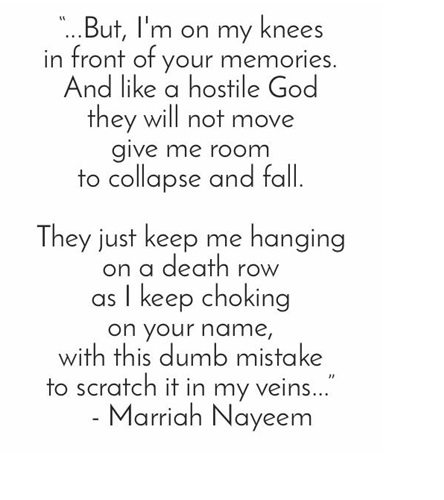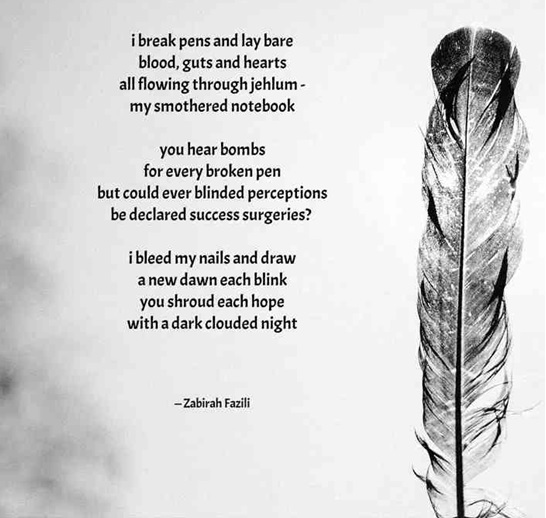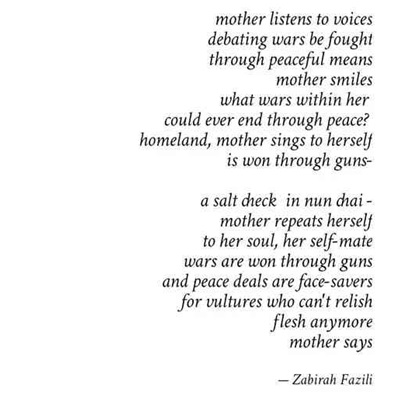
Zainab Kehwa
Poetry has not only documented stories of Kashmiris, but it has also narrated the soul of modern Kashmir’s chronicle of resistance. Today, amid the new era of resistance and bleak scenarios, Kashmir’s youth has once again found solace and resistance in poetry. And just like every resistance movement history has recorded, women in Kashmir have also taken the lead role in narrating the collective struggle.
ALSO READ: Kashmir Funerals: A Ventout Ground to Foster Friendship Amongst Girls
When the dead in Kashmir turn to mere statistics, Kashmiri poets turn to their paper, write in red; the cries, the lamentations, and the wails. It is through their verses that Kashmir finds articulation of the collective pain and suffering. They write of happy times with a touch of ache and painfully sad times with a touch of contentment.
“I remember you—
but your face is a blur.
My memory aches
from having to hold on too tight
to that final glimpse
and that smile.”
-Marriah Nayeem
The Kashmiriyat, interacted with two such rising contemporary Kashmiri women poets who resist, by writing about womanhood, empowerment, self-reliance, revolution, violence, resistance, religion, and romance.
ALSO READ: Arq e Gulab- The Fading Aroma from Kashmir
Zabirah Fazili, an English postgraduate from the University of Kashmir, and Marriah Nayeem, a postgraduate research scholar at SKAUST-K, spoke to The Kashmiriyat about their experiences, writings, inspirations, and dreams.
Developing her connection with poetry since the 2010 uprisings, Zabirah, describes her poetry as initially an attempt to channelize her anger. Zabirah states her inspiration as the blood on her streets and “lately the male dominance that reminds her of being a woman every now and then”.
As a Muslim Kashmiri Woman poet, Zabirah is of the view that her poetry is a “blend of all the three identities. Be it a Muslim, a Kashmiri, or a woman, all three have their throats under sharp swords- All the three identities call for my onslaught and of course name-calling. And my poetry reflects exactly that most of the time.”
While talking about how hard it is for young women to show resistance in Kashmir, Zabirah spoke about the persecution of journalists, traders, and young boys for just being Kashmiris and asked readers to imagine how hard it would be for women to raise their voice for the truth.
“You don’t know what night the state will knock at your door and book you under UAPA. The times ahead are tough and so is our resolve.”
Zabirah believes that the best her poetry can do is unite Kashmiris “under the umbrella of emotions of love, anger, and resistance.” She hopes her poetry can be used not only to invoke hope amongst fellow country-people but also to document Kashmir’s collective obituaries and memory.
“You don’t know what night the state will knock at your door and book you under UAPA. The times ahead are tough and so is our resolve.”
Finding words for her poems on the prayer mat, Zabirah looks up to the work of fellow Kashmir poets namely; Zeeshan Jaipuri, Rumuz e Bekhudi, Omair Bhat, and Shabir Ahmad Mir. She also relates to Palestinian poets Mahmood Darvish, and Rafeef Ziadah.
Marriah Nayeem, started writing when she was in 6th standard after getting inspired by a senior in school, she wrote her first poem, ‘Mother’, about her motherland, her ‘moujkashir’. “It is my only poem which ended on a happy note because I was too young and naïve to understand the complexities of living in a conflict zone”.
 Hope becomes a naivety in the land where the dawn is painted red with the blood of youth. This was a 12-year-old, having absorbed the atrocities around and trying, through poetry to make sense of it.
Hope becomes a naivety in the land where the dawn is painted red with the blood of youth. This was a 12-year-old, having absorbed the atrocities around and trying, through poetry to make sense of it.
She is a versatile writer, not limiting her writings to just political resistance, “I like to push my limits and try new genres all the time”
Talking about her writing process as venting out her feelings, she says, “I write in one sitting. But the editing takes a lot of time”.
Writing always has a complementary in reading. Reading helps in understanding the process of expressing oneself through words. She says, “Reading is important for the betterment of the language. The more books you read, the better you get at the language, the more sophisticated your vocabulary becomes. I read novels and poetry a lot”.
Talking about her womanhood and her doubly marginalized voice, she says, “I write because my femininity inspires me. I feel indebted to the space that I have been given to speak as a Kashmiri Muslim and especially as a woman. I want to narrate things from the perception of women, about how deeply woman feel, their endurance, and their bravery. Also, I want our men to know that they are not alone. This fight is ours’. Together side by side,”
Her writing is not just cathartic for her but also therapeutic. “Sometimes I write for myself. Other times, I write for people. I want my people, Kashmiris to find my work relatable so they wouldn’t feel alone. For outsiders, I am trying to document our pain”.
Like many other writers she, through her work, wants to bring international attention to the Kashmir conflict. She is hoping that along, with her contemporaries, to bring international support and attention to Kashmir. Her poetry is inspired by Aga Shahid Ali, Mahmud Dervish, Pablo Neruda, and Warsan Shire.
 As a message to the people, she said, “Revolution does not inspire masses. Masses inspire the revolution. The only way to bring about this revolution is through the masses.”
As a message to the people, she said, “Revolution does not inspire masses. Masses inspire the revolution. The only way to bring about this revolution is through the masses.”
“Revolution does not inspire masses. Masses inspire the revolution .The only way to bring about this revolution is through the masses.”
A spirit of defiance and non-conformity through literature and arts is not something recent for Kashmir. But young poets like Zabirah and Marriah aim to challenge the dominant hegemonic ideologies, helping people to recognize the deeply rooted hostile structures and ideas established in Kashmir.
As rising women poets, Zabirah and Marriah’s words resonate with Kashmiri masses and oppressed people around the world resisting the unacceptance of their identity, rights, and livelihood.






